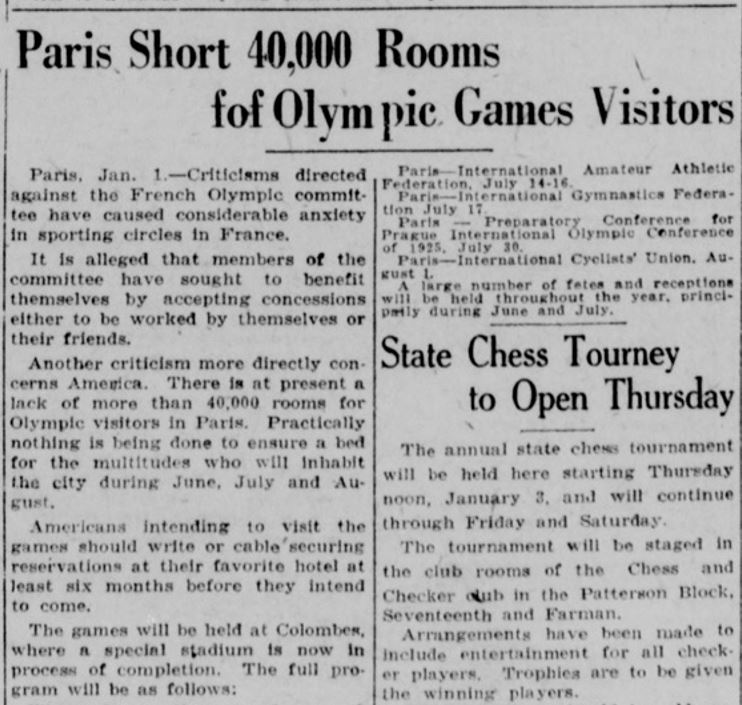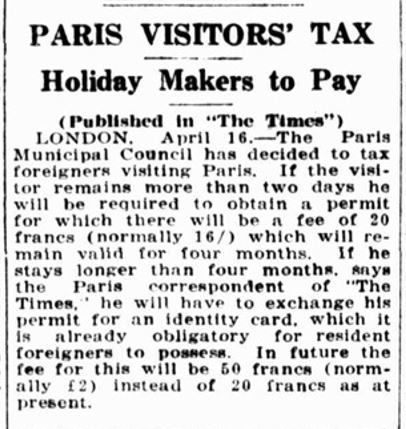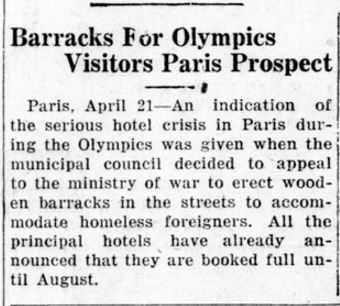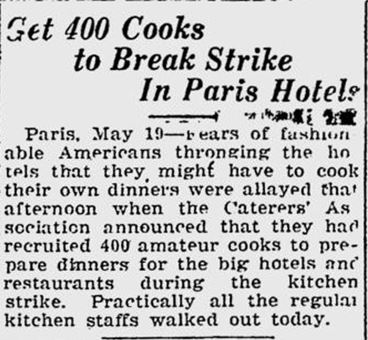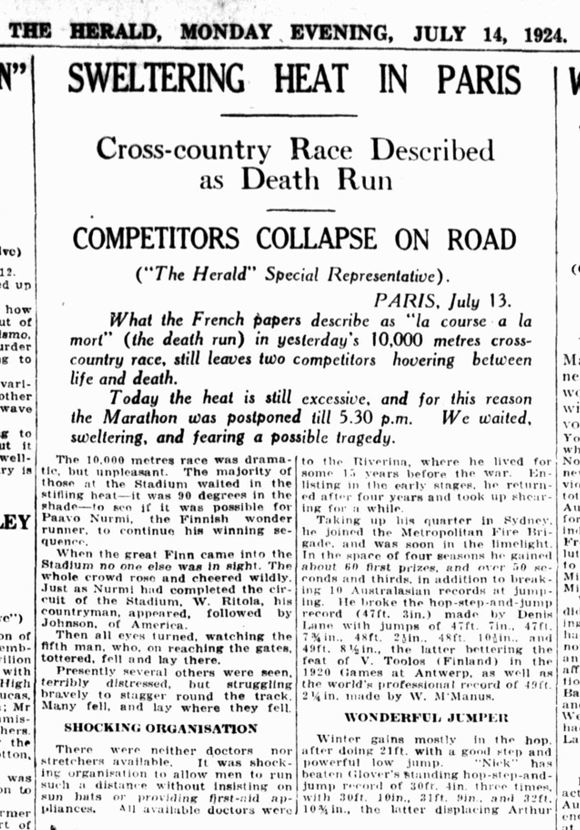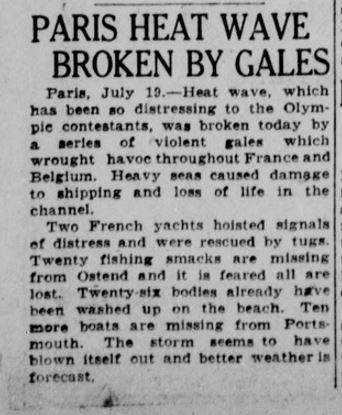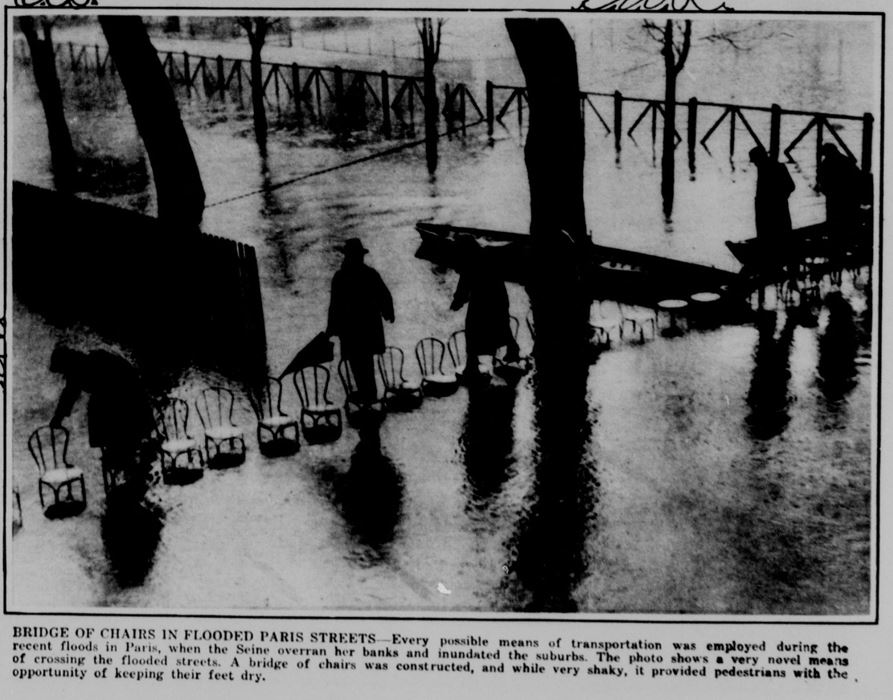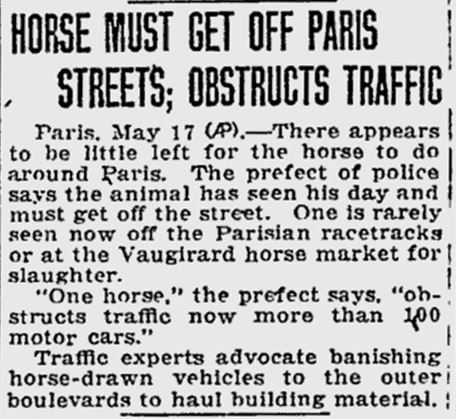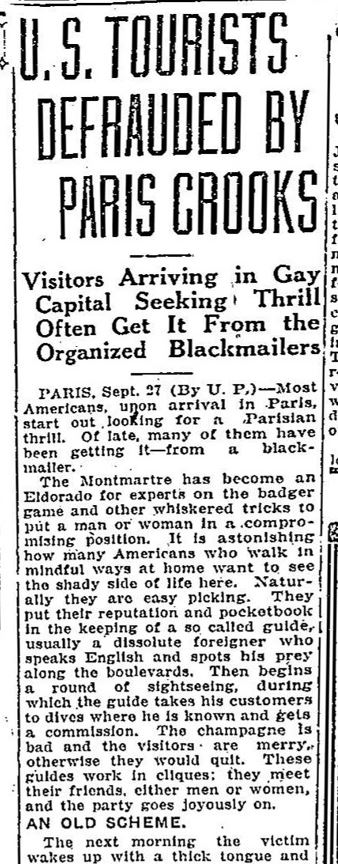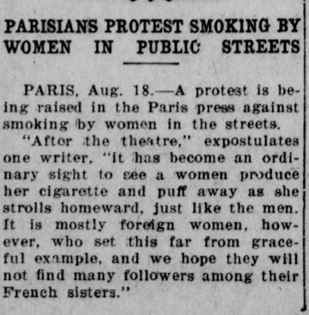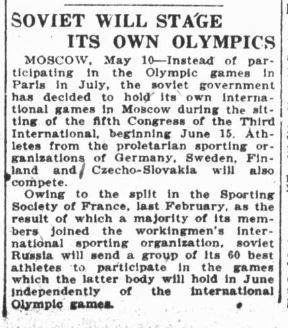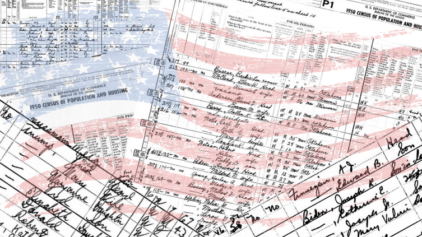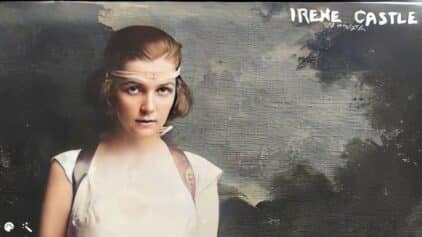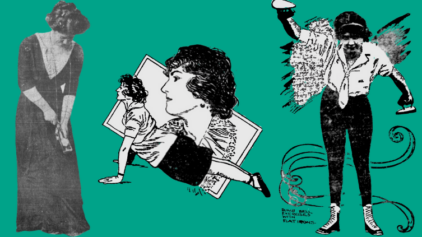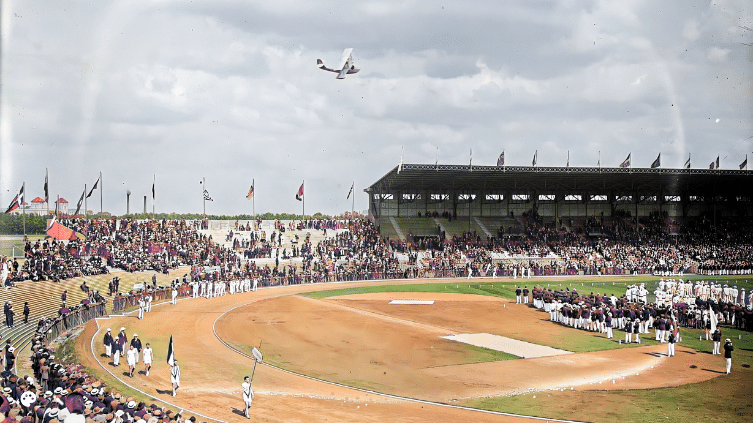

On July 26, exactly 100 years after Paris hosted the last Olympics in 1924, thousands of athletes and fans will arrive in the City of Lights. Since it hosted the Olympic Games at the beginning of the last century, many things have changed… but many have stayed the same. Although horses no longer trot along the Champs-Elysées, charging tourists extra taxes is still an issue. A heat wave that hit Paris then may burden the athletes this time as well. Now, just like then, Russia will not participate.
The MyHeritage Research team dove into the newspaper archives on OldNews.com and examined the differences between the two Olympics, exactly 100 years apart. Here’s what we found.
The 1924 accommodations crisis
While hotel managers in Paris began arming themselves against bedbugs in October 2023, way ahead of the 2024 Olympic Games, their counterparts a century ago were already busy counting the francs.
Currently, short-term rentals are still relatively available and predictions are that only 60–70% of hotel rooms will be occupied during the 2024 Paris Olympics. A century ago, the situation was completely different.
Months before the opening of the Olympic Games, in January 1924, it became clear that an accommodation crisis was mounting in the City of Lights. ”Paris short 40,000 rooms for Olympic Games visitors,” warned The Omaha Morning Bee in January 1924, 4 months before the opening whistle. The newspaper stated that “practically nothing is being done to ensure a bed for the multitudes who will inhabit the city during June, July and August.” The newspaper clarified for its readers, a little too late, that: “Americans intending to visit the games should write or cable securing reservations at their favorite hotel at least six months before they intend to come.”
Accordingly, accommodation costs skyrocketed in 1924. One century later, it ‘s not clear whether this will be the share of hotel and rental owners.
A month prior to the opening of the games, The Boston Transcript used creative language to describe the bumps ahead of the American tourist’s way to Paris: “Tourists coming over this summer to attend the Olympic games would better buy return tickets before quitting the shores of the United States as they will have nothing left after Paris hotel keepers finish with them. From the vanguard which has arrived and which is filling the larger hotels a wail is going up which echoes all the way from Montmartre to Montparnasse.”
To add to the already high economic burden on the tourists in Paris, according to The Herald, the city’s municipal council decided to tax them if they stayed more than 2 nights in the city.
All this did not stand in the way of the determined tourists to the 1924 Paris Olympic games.
Two weeks before the opening ceremony, “all the principal hotels” in Paris announced that they were fully booked for 3 months, until after the end of the Olympic Games.
According to the following news item at Rochester Daily Post and Record, the “hotel crisis in Paris during the Olympics” was so severe that one of the solutions suggested constructing “wooden barracks” for the “homeless foreigners.”
The kitchen workers’ strike
Paris’s waiters started their warm-up for the 2024 Olympic games months ago, as demonstrated by the resurrection of the historically traditional waitering race (“Course des cafés”) held at the French capital on March 24, 2024, as a pre-celebration.
A century ago, the Parisian kitchen workers, mainly the cooks, were a source of significant concern for the organizers of the Olympic Games. In May 1924 their union declared a two-week strike, aimed at improving public perception of the profession and gaining leverage with restaurant owners and the government. The timing of the strike threatened to disrupt food service for the influx of athletes and visitors. As The Crawfordsville Review reported on May 18, 1924, the caterers association came up with a solution for the “fashionable Americans thronging the hotels” of Paris and recruited “400 amateur cooks to prepare dinners for the big hotels and restaurants during the kitchen strike.”
Bad weather is old news
A climate crisis topped the headlines a century ago.
Today, one of the central missions of the International Olympic Committee is observing environmental responsibility, due to the growing climate crisis, and aligning with the Paris Agreement on Climate Change. Back in 1924, there may have been less awareness surrounding climate change, but the weather in Paris showed no mercy.
The Herald’s report on July 13, 1924, titled “Sweltering Heat in Paris,” quotes French newspapers describing the 10,000-meter cross-country race as the death run — “la course a la mort” — leaving “two competitors hovering between life and death.” The excessive heat (“90 degrees in the shade”) led to the postponement of the marathon race. “We waited, sweltering and fearing a possible tragedy,” wrote The Herald’s special representative to the Olympic games, adding a fair amount of criticism: “It was a shocking organization to allow men to run such distance without insisting on sun hats or providing first aid appliances.”
Several days later, on July 19, 1924, The Omaha Morning Bee reported that the severe “heat wave, which had been so distressing to the Olympic contestants, was broken.” But one evil was replaced by another. The heat wave was replaced “by a series of violent gales which wrought havoc throughout France and Belgium. Heavy seas caused damage to shipping and loss of life in the channel.”
Storms and floods abounded both before and during the Olympic Games in 1924. In March, just a few months before, the Paris streets were flooded “when the Seine overran her banks and inundated the suburbs,” reported The Omaha Morning Bee, presenting a photo of “a very novel means of crossing the flooded streets” of Paris: “a bridge of chairs providing pedestrians with the opportunity of keeping their feet dry.”
This year, in light of the severe heat wave that hit Paris in 2003, which claimed the lives of thousands, there is a fear that a similar heat wave will hit the region during the Olympics and disrupt the games and potentially endanger the athletes. Let’s hope the Seine stays calm this time, especially as the opening ceremony will be held along the river banks.
Transportation upgrades
Transportation is one of the main concerns regarding the Paris 2024 Olympic games, since the city’s public transport system, already strained, would be heavily burdened by the influx of visitors.
The municipality recently embarked on a campaign designed to make Paris greener by reducing dependence on cars. 100 streets were closed to motor vehicles, parking fees were tripled, tens of thousands of parking spaces were vacated, and over 800 miles of bike lanes were built. As a result, air pollution was cut 40%.
A century ago a major transportation upgrade took the form of excluding horse-drawn vehicles. “The prefect of police says the animal has seen his day and must get off the street,” stated the Reading Eagle in May 18, 1924. According to the prefect of police, “one horse obstructs traffic now more than 100 motor cars.”
Preventing crime and scandal
Security is yet another concern and a much more challenging one. Only recently, the French security authorities foiled a plan to attack soccer events during the Olympics, and arrested a suspected planning violent action during the Olympic torch relay.
Ensuring security for a large-scale event with a unique open-air ceremony on the Seine required years of careful preparation.
A century ago the possible threats to the visitors’ security were due to their thrill seeking. The Salt Lake Telegram warned its readers of “Paris crooks,” but stated that the trouble begins because “most Americans, upon their arrival in Paris, start out looking for a Parisian thrill,” and then get into trouble.
The newspaper goes on to tell the story of an “American girl, uncommonly pretty and uncommonly stupid,” who fell victim to the city’s crooks. “These blackmailers are ingenious and find easy prey among foreign girls and women ignorant of the darker side of life.” The “pretty but stupid” American girl was blackmailed without difficulty. “She could easily have brought these men to the police, but, unfamiliar with Paris ways and fearing publicity, she preferred to pay the price and keep quiet.”
The Parisians, from the other side, didn’t see the foreign women visiting the city in the same way. The Alaska Daily Empire reported in August 1924 that “Parisians protest smoking by women in public streets — just like the men.” The “far from graceful example” was mostly by foreign women, and the Parisians expressed their “hope they will not find many followers among their French sisters.”
Russia and the Olympics
History repeats itself in an interesting way regarding Russia’s participation in the Olympic Games. The Soviet Union runs second to the U.S. with the number of Olympic medals. In the 2024 games, Russia as a country will not be participating, but individual Russian and Belarusian athletes may be able to compete under specific conditions set by the International Olympic Committee. These athletes would compete as neutral athletes, meaning they won’t represent Russia and won’t be allowed to use Russian flags or anthems. The same goes for Belarus, due to its support of Russia.
A century ago, in 1924, the Soviet Union was not invited to participate in the Paris Olympics. This was likely due to the ongoing political tensions between the communist state formed 2 years prior and other established governments of the world. The Soviet Union wouldn’t compete in the Olympic Games again until 1952.
The Boston Herald reported on May 10, 1924, that “the Soviet government decided not to participate in the Olympic games,” but rather hold “its own Olympics” in Moscow, with “athletes from the proletarian sporting organizations of Germany, Sweden, Finland and Czech-Slovakia also competing.” This was not very accurate. There was an event called the “Red Sports and Gymnastics International” held in Moscow in 1924, but it was seen as a way to promote physical fitness and socialist ideals among the working class, not a competition in the traditional Olympic sense. It was more of a gathering and demonstration of athletic prowess among socialist nations.
The world has certainly shifted a great deal in the past 100 years, but some things never change. The ultimate goal of the Olympics remains, as ever, to serve as a chance to bring the people of the world together for a friendly competition celebrating human achievement in sports. We wish the competing athletes the best of luck!
What other aspects of life have changed in the past century? Discover more fascinating stories from the past in the historical newspapers on OldNews.com.
